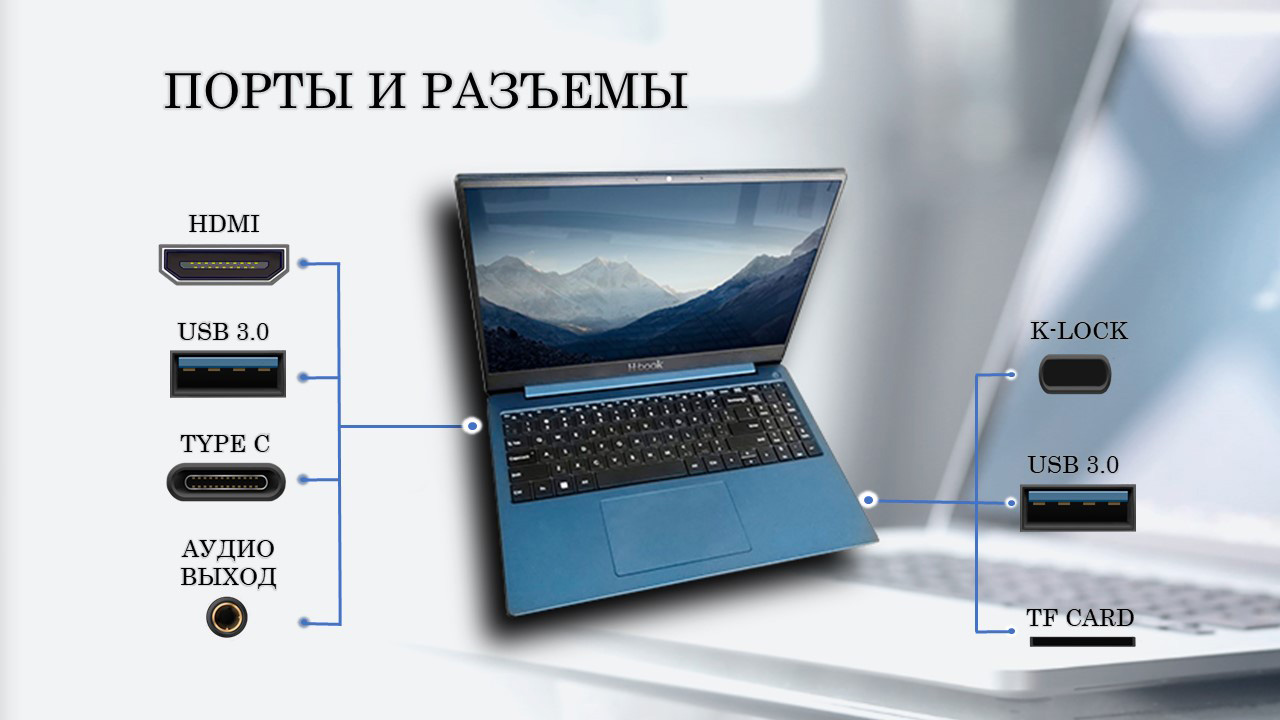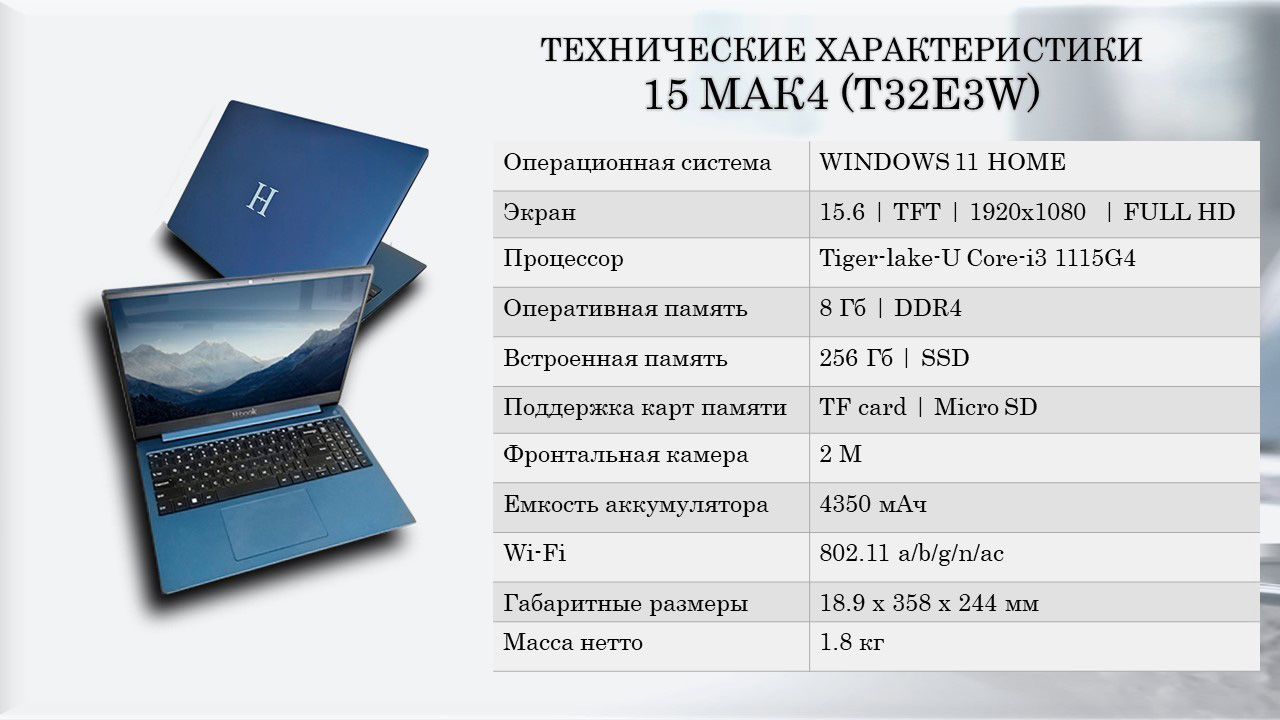Belarus Pushes 'Homegrown' Horizont H-book Laptop Amid Stiff Sanctions
Belarus-based Horizont launches H-book Mak4 laptop.
No country wants to be on the receiving end of crippling sanctions that could hinder entire industries. However, when such hardships arise, governments often look inward to find domestic companies that can potentially fill any gaps. This is precisely what Minsk, Belarus-based state-controlled Horizont is attempting this week by introducing the H-book Mak4 notebook.
"This is a domestic product developed on the basis of the leading-edge know-how and technologies," said Yuri Predko, the head of Horizont, reports CNews. "The laptop can compete with notebooks from world-class brands."
While the Horizont H-book Mak4 (T32E3W) is called "the first Belorussian' laptop," the 15.6-inch notebook runs Microsoft Windows and is based on Intel's Core i3-1115G4 processor paired with 8GB of DDR4 memory and a 256GB SSD. However, these four critical system components were developed and produced outside Belarus.
In fact, when the machine was demonstrated for the first time in September, its developers admitted that only 12% of its parts were made in Belarus, but they hoped to increase the share of domestic parts to 30% by the end of the year. Unfortunately, we don't know if the company succeeded in increasing the percentage of Belarus-made components in the machine.
Apart from political agenda designed to show unacquainted audiences how sophisticated Belarus technologies are, the Horizont H-book Mak4 notebook is a somewhat outdated yet sleek entry-level workhorse (especially when compared to the Bitblaze Titan running a 'Russian' SoC).
The 15.6-inch laptop features a Full HD IPS display, Wi-Fi 5 + Bluetooth combo adapter, one USB 3.0 Type-C port, two USB 3.0 Type-A connectors, an HDMI output, and an SD card reader. The machine is up to 18.9 mm thick, weighs 1.8 kilograms, and promises to work for up to eight hours on one charge.


Horizont is a relatively well-known maker of consumer electronics, so it is possible that it orders components from suppliers and then assembles everything at its own facilities. However, we have no idea whether it does surface-mounting of the motherboard itself or procures motherboards from its partners in China, a country that is very friendly with Belarus.
Get Tom's Hardware's best news and in-depth reviews, straight to your inbox.
Since AMD and Intel do not officially supply their parts to the Republic of Belarus, just like dozens of other companies, Horizont has to buy CPUs from various China-based resellers (which is quite risky, so to speak), and they tend to sell outdated components.
Meanwhile, Intel's Tiger Lake is not a bad processor. Windows is the world's most popular operating system, used by ~90% of the population, so the Horizont H-book Mak4 is a universal machine. The only question is, why is it called a 'Belorussian laptop' if it is still primarily based on American technology?

Anton Shilov is a contributing writer at Tom’s Hardware. Over the past couple of decades, he has covered everything from CPUs and GPUs to supercomputers and from modern process technologies and latest fab tools to high-tech industry trends.
-
DavidLejdar Depends on the definition, doesn't it? E.g. would you consider an iPhone to be American? If going by "made in" of parts and final assembly, then no, but if going by where the HQ of the final product's company is at, then yes?Reply
Or would the definition be about IP specifically? And in that case, would e.g. Rolls-Royce be considered to be German since it is a subsidiary of a "German company"?
And then there is also the question about whether it is not a bit too simple to attribute a nationality to the private market. E.g. Tesla, it is not owned by the U.S., is it? And if Mr Musk becomes a Chinese citizen tomorrow and moves the HQ of Tesla to Mexico and additionally perhaps sells a majority of shares to Saudi Arabia, then "what" would Tesla be? -
LordVile Reply
It’s just the company, wondering how they got around the sanctions thoughDavidLejdar said:Depends on the definition, doesn't it? E.g. would you consider an iPhone to be American? If going by "made in" of parts and final assembly, then no, but if going by where the HQ of the final product's company is at, then yes?
Or would the definition be about IP specifically? And in that case, would e.g. Rolls-Royce be considered to be German since it is a subsidiary of a "German company"?
And then there is also the question about whether it is not a bit too simple to attribute a nationality to the private market. E.g. Tesla, it is not owned by the U.S., is it? And if Mr Musk becomes a Chinese citizen tomorrow and moves the HQ of Tesla to Mexico and additionally perhaps sells a majority of shares to Saudi Arabia, then "what" would Tesla be? -
bit_user Well, it's faster than my laptop, which has the same specs, except for being a Skylake i3 with 13" screen.Reply
Then again, I don't do anything very serious with that machine, any more. Neither machine would be great for things like compiling a lot of software. -
PC Hardware Nerd Reply
I hear you there. My personal laptop is still an old skylake i7. I use it mainly for web browsing so until win10 support ends I don't have a compelling reason to upgrade.bit_user said:Well, it's faster than my laptop, which has the same specs, except for being a Skylake i3 with 13" screen.
Then again, I don't do anything very serious with that machine, any more. Neither machine would be great for things like compiling a lot of software. -
Co BIY Replybit_user said:Well, it's faster than my laptop, which has the same specs, except for being a Skylake i3 with 13" screen.
Then again, I don't do anything very serious with that machine, any more. Neither machine would be great for things like compiling a lot of software.
I don't think most users "Do anything serious" with their laptops. If by "serious" you mean anything technically challenging for the machine.
Most work done on laptops/tablets/desktops could be done with much less capable hardware. It is the connectivity that really makes these devices useful. -
Bazzy 505 Eh, i know it's a slow season for reporting on hardware but .. first elbrus/baikal then this .. there's gotta be something else actually notworthy out there Anton ;)Reply
It's one of the standard ODM designs from Clevo, nothing "belarussian" about it, L141 design variant by the looks of it